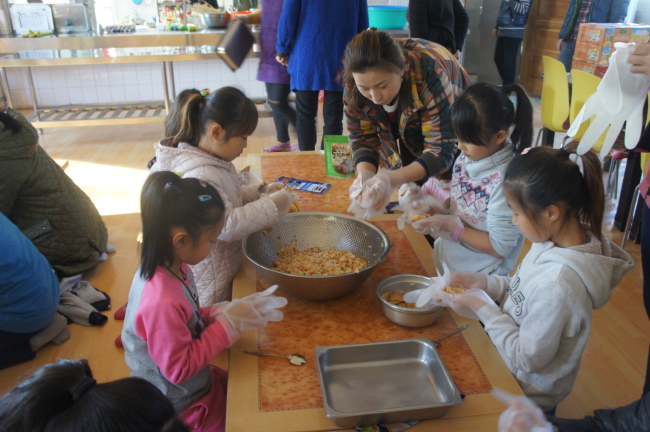
Korea is beginning to see new trends emerge for “sending the year off,” perhaps to complement the nation’s health habit trends, some analysts have said.
Year-end celebrations in Korea, which have been traditionally dominated by drinking, are now embracing various cultural, artistic and recreational activities.
Similar to the drinking campaigns that quickly caught on among domestic firms to help moderate excessive indulgence in alcohol at their year-end gatherings, more people each year are pursuing activities that entirely replace drinking.
“Drinking late into the night is not only a health concern, but also affects employees’ productivity on the following day. I consider it a win-win for the employees as well as the company,” said Lee Seung-li, a manager at Samsung Fire & Marine Insurance’s public relations department.
According to a survey Samsung Fire & Marine Insurance gave to 1,867 of its employees, attending a cultural experience, such as a movie, play or concert, topped the list as the most desirable activity for the year-end party.
Close behind in second place at 20.4 percent was dining at a family restaurant, while consuming alcohol was fourth and hiking was deemed the least preferred activity.
According to Lee Yong-woo, a department chief at the Federation of Korean Industries, such developments are part of the corporate community’s efforts to foster wholesome business ethics by voluntarily creating campaigns and alternatives to drinking.
Lee also predicted that as more companies benchmark related developments, similar practices will eventually be adopted by at least half of businesses.
POSCO Engineering & Construction is one company that has already taken such initiatives.
“The PR department, where I work, carried out its office party at a family restaurant this year,” said POSCO E&C Kim Hyung-woo. “It was agreed upon by me and my colleagues that none of us needed another reason to drink, especially when we had already attended numerous such occasions elsewhere at other obligatory year-end gatherings.”
According to him, other departments at his company also chose more leisurely options and instead went out for bowling or hosted a table tennis tournament.
Government sector workers and civil servants are no exception to this growing phenomenon.
Due to the prolonged economic recovery and a hectic year of work, most public officials are all for the idea of ending the year on a comfortable note.
They are known to often attend movies or theatrical performances for their year-end celebrations.
In fact, several sources revealed that performing art groups and affiliated businesses are starting to promote and provide more concerts, plays and musicals toward the end of the year.
A spokesperson for a provincial government stated, “We have been replacing alcohol with various cultural activities for the last few years. This year we have agreed to watch either a play or a movie and end with a brief meal afterwards.”
Some of the younger public servants are said to enjoy even more uncommon events like pajama parties.
Some companies have expanded their definition of what constitutes a year-end party to include volunteer service or social contributions.
There are a growing number of both groups and individuals who are spending the holiday season by visiting homeless shelters or disability centers, delivering coal briquettes to elderly people, sharing kimchi with neighbors and making other charitable contributions.
Korean Air’s communications division, for instance, sold refreshments and held a bazaar sale this year at their company-sponsored cafe in Samsung-dong ― donating all of the day’s proceeds to the United Help for International Children organization.
POSCO E&C is already known to have followed suit and pursued such meaningful activities since 2010, when it replaced drinking traditions with community service and volunteer work.
Samsung SDI, on the other hand, sent the year off with a “talent donation,” where 20 of its best employee singers formed a choir and visited nearby hospitals to deliver their support to patients of severe and incurable illnesses.
Other unique company year-end events have included camping and dress-code parties, where employees appear wearing fancy dresses and tuxedos.
Meanwhile, there are also companies, like Hyundai Marine & Fire Insurance, that simply provide their employees with more family time ― even designating every Wednesday as a “family day,” when employees are allowed to leave work a bit earlier.
Whether this trend is a part of Korea’s well-being lifestyles movement ― such as eating healthily and giving up smoking ― is not yet clear, but the tide has definitely begun to turn and it appears these alternative approaches will stick around and only continue to spread in the near future.
By Kim Joo-hyun (jhk@heraldcorp.com)
-
Articles by Korea Herald




![[K-pop’s dilemma] Can K-pop break free from ‘fandom’ model?](http://res.heraldm.com/phpwas/restmb_idxmake.php?idx=644&simg=/content/image/2024/05/09/20240509050541_0.jpg&u=20240509173751)




![[News Analysis] Yoon's first 2 years marked by intense confrontations, lack of leadership](http://res.heraldm.com/phpwas/restmb_idxmake.php?idx=644&simg=/content/image/2024/05/09/20240509050612_0.jpg&u=20240509233252)

![[Graphic News] Beer the most favored alcoholic drink by Koreans](http://res.heraldm.com/phpwas/restmb_idxmake.php?idx=644&simg=/content/image/2024/05/09/20240509050765_0.gif&u=)







